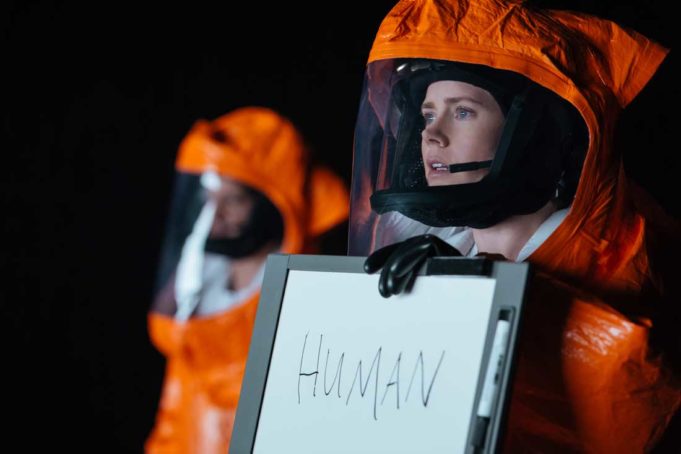Ted Chiang’s “Story of Your Life” is a terrific and well-nigh unfilmable piece of science fiction. Frequently told in the future tense, this lengthy short story is a mother’s love letter to her daughter interwoven, somehow convincingly, with a story about deciphering the language of space aliens. Denis Villeneuve is one director who won’t quail from a challenge, and so we get Arrival, adapted from Chiang’s story. It’s rather good, too, but not because of the people behind the camera.
The story begins with 12 extraterrestrial ships that look like giant black stone obelisks arriving in seemingly random locations on Earth and coming to rest slightly above the ground. One location is in Montana, which is where the U.S. government brings in linguistics professor Louise Banks (Amy Adams) along with a theoretical physicist (Jeremy Renner) to try to communicate with the aliens — seven-legged beings that look like walking tree trunks — and ultimately figure out why they’ve come here.
The story is frequently interrupted by what turn out to be flash-forwards: As a result of learning the language of a race that has no concept of time (expressed through circular graphics whose meaning is conveyed in the curlicues and offshoots), Louise starts to have visions of a daughter who hasn’t been conceived yet. Screenwriter Eric Heisserer honors Chiang’s story by delving deeply into linguistics, but unfortunately, he also tries to inject some conventional dramatic tension by having different nations and different factions within our own country go back and forth over whether the aliens are hostile and warrant military action. This doesn’t work well at all, and it sadly wastes Forest Whitaker as the Army colonel in charge of the Montana site. The bit near the end, when the aliens’ language is translated for us through subtitles, takes away too much of the film’s mystery. A more sympathetic director might have gotten this movie closer to the emotional power it wants, but Villeneuve isn’t the guy for that. Instead, he gives us chilly virtuosity with the shift in gravity as the people board the spaceship and a “how did they film that?” shot late on as Louise enters a nether space to talk to the aliens. Like some other Villeneuve movies, this one looks great even while it remains distant.
Or at least it would if Adams weren’t at the center of things. She projects all the notes in the character: anxiety-ridden, vulnerable, lonely, beset by memories of things that haven’t happened. Her innate decency seems to explain Louise’s moments of reckless courage, like the early bit when she ignores the warnings about contamination and rips off her Hazmat suit so the aliens can see her. She’ll tear your heart out, too, with a late speech to her 6-year-old daughter (Jadyn Malone) as she hides what she knows about their future. Without her, Arrival becomes an arid and talky exercise, but thanks to her remarkable efforts, this thoughtful science-fiction epic has human warmth at its core.
Arrival
Starring Amy Adams and Jeremy Renner. Directed by Denis Villeneuve. Written by Eric Heisserer, based on Ted Chiang’s short story. Rated PG-13.












